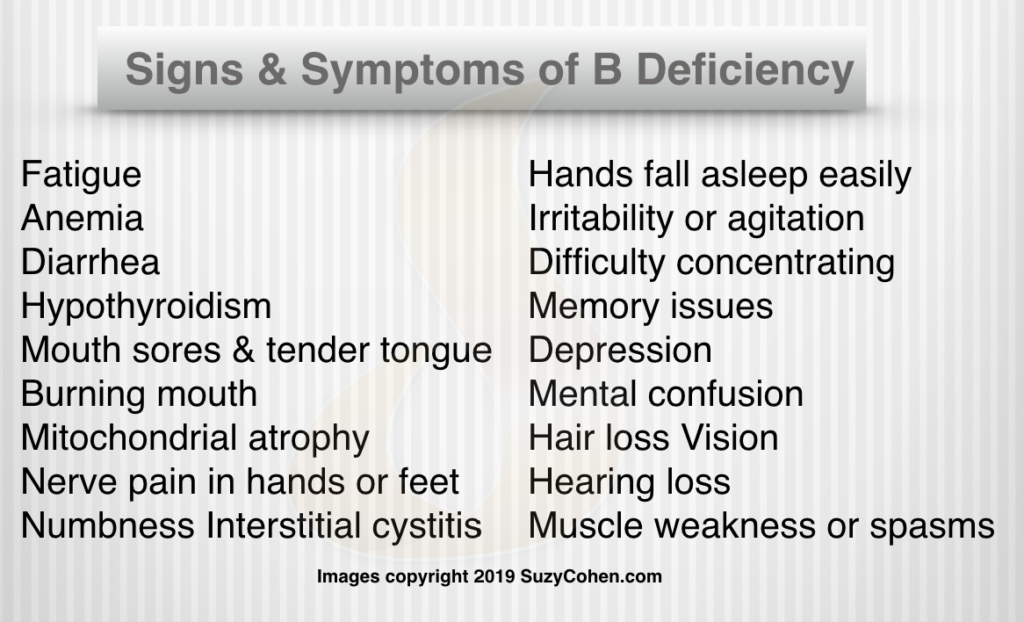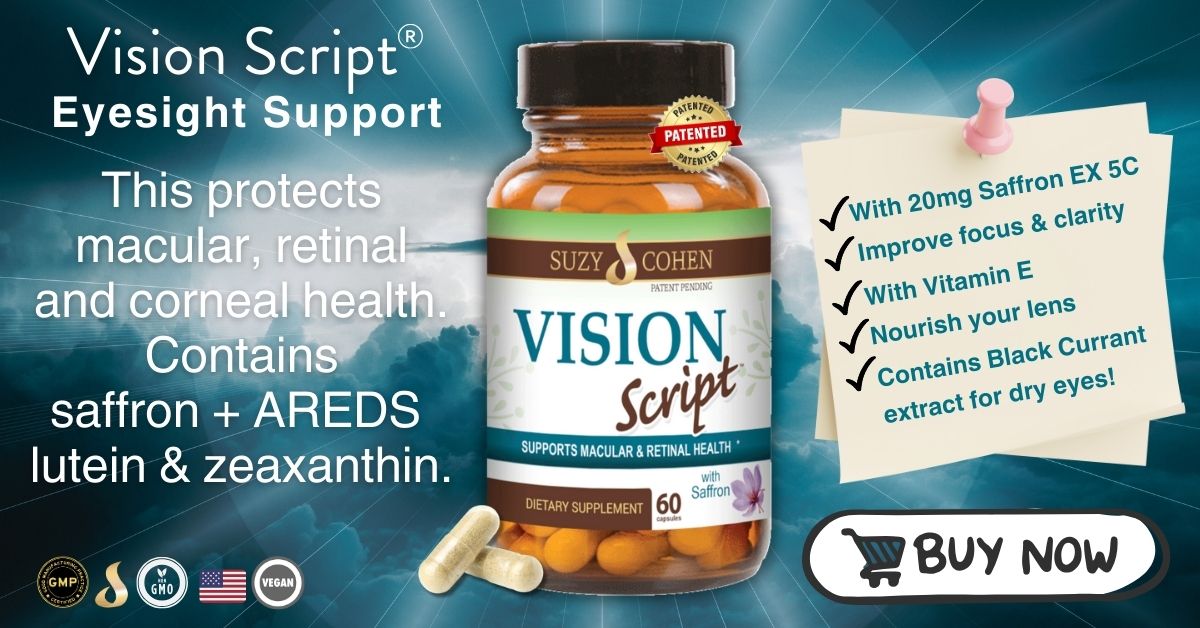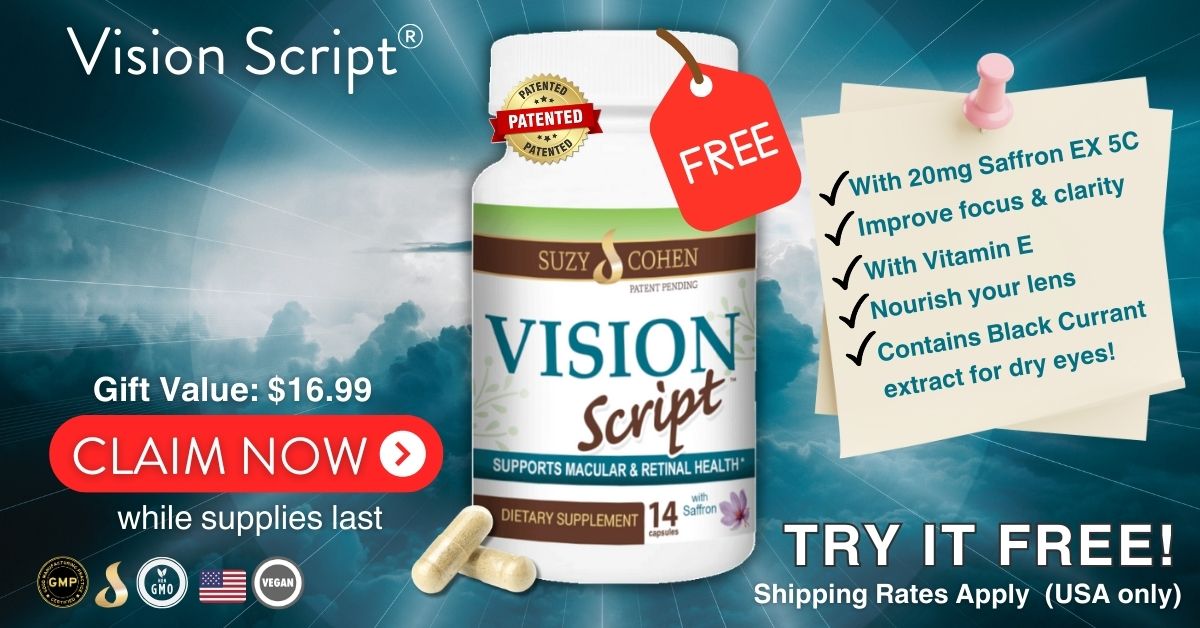What's On This Page?
ToggleToday we’re talking about how junk food can increase risk of visual deficit, including blindness! And it’s because of a deficiency of B vitamins mainly.
When you think of B complex, you probably think of it as one B vitamin, but “B Complex” refers to a group of B vitamins consisting of B1, B2, B3, B6 and others.
The B Complex available as a dietary supplement is intended to fill a nutrient gap that some people develop from malnutrition. This is fine, however most people can eat their way to better B status.
The concerns about B vitamin deficiency are frequently overlooked by the most caring practitioners. Remember, the mindset in today’s atrocious health care system is to medicate you, so you’re bound to get a drug for a symptom, even if that symptom stems from a nutrient deficiency!
B Vitamins Have an Impact on Vision
B vitamins are crucial for various physiological functions, including maintaining nerve health, energy metabolism, and the overall health of various tissues, including those in the eye. A deficiency in any of the B vitamins can lead to different health problems, some of which can contribute to visual impairment or blindness. Here’s how deficiencies in each B vitamin can be linked to vision problems:
1. Vitamin B1 (Thiamine)
- Deficiency Consequences: Thiamine deficiency can lead to a condition called beriberi, which has neurological (dry beriberi) and cardiovascular (wet beriberi) forms. In its neurological form, thiamine deficiency can cause Wernicke’s encephalopathy, a condition that can lead to problems with eye movement, double vision (diplopia), and eventually optic neuropathy if not treated.
- Impact on Vision: Thiamine deficiency can lead to optic neuropathy, characterized by damage to the optic nerve, resulting in impaired vision and, if severe and untreated, potentially leading to blindness.
2. Vitamin B2 (Riboflavin)
- Deficiency Consequences: Riboflavin is crucial for the health of the cornea and the vascular system in the eyes. Riboflavin deficiency can result in ariboflavinosis, characterized by sore throat, redness and swelling of the lining of the mouth and throat, cracks or sores on the outsides of the lips (cheilosis) and at the corners of the mouth (angular stomatitis), and a swollen, magenta-colored tongue (magenta tongue).
- Impact on Vision: Riboflavin deficiency is associated with cataract formation, where the lens of the eye becomes progressively opaque, leading to impaired vision. Long-term deficiency can exacerbate the risk of cataracts, potentially leading to blindness if not managed.
3. Vitamin B3 (Niacin)
- Deficiency Consequences: Niacin deficiency causes pellagra, which is characterized by dermatitis, diarrhea, and dementia (the three D’s). Pellagra can also have neurological effects.
- Impact on Vision: Severe niacin deficiency has been linked to optic neuropathy, leading to blurred vision and, in extreme cases, central scotomas (blind spots in the visual field). Untreated, this can lead to blindness due to irreversible optic nerve damage.
4. Vitamin B5 (Pantothenic Acid)
- Deficiency Consequences: Deficiency in pantothenic acid is rare and typically associated with a diet lacking in a wide variety of foods.
- Impact on Vision: There is limited evidence directly linking pantothenic acid deficiency to blindness. However, some animal studies suggest that deficiency might lead to damage to the corneal epithelium, potentially impairing vision.
5. Vitamin B6 (Pyridoxine)
- Deficiency Consequences: Vitamin B6 deficiency can lead to microcytic anemia, dermatitis, depression, confusion, and convulsions.
- Impact on Vision: While direct links to blindness are not well-documented, severe vitamin B6 deficiency could contribute to neurological problems that might indirectly affect vision, including changes in neurotransmitter function that could impair visual processing.
6. Vitamin B7 (Biotin)
- Deficiency Consequences: Biotin deficiency is rare, as biotin is found in many foods and is also produced by gut bacteria. Symptoms include hair loss, skin rash, and neurological symptoms like depression and hallucinations.
- Impact on Vision: There is no strong evidence linking biotin deficiency directly to blindness, but severe neurological impairment could potentially affect visual processing or eye health indirectly.
7. Vitamin B9 (Folate)
- Deficiency Consequences: Folate deficiency can lead to megaloblastic anemia, cardiovascular problems, and, in pregnant women, can cause neural tube defects in the developing fetus.
- Impact on Vision: Folate deficiency can contribute to homocysteine accumulation, which may damage the small blood vessels, including those in the retina, potentially contributing to age-related macular degeneration (AMD) and other retinal issues, indirectly increasing the risk of vision impairment.
8. Vitamin B12 (Cobalamin)
- Deficiency Consequences: Vitamin B12 deficiency leads to pernicious anemia and neurological problems, including damage to the nervous system.
- Impact on Vision: Vitamin B12 deficiency can cause optic neuropathy, resulting in gradual vision loss due to damage to the optic nerve. This damage can lead to central or peripheral vision loss, and in severe, untreated cases, it can lead to blindness.
Conclusion
Each B vitamin plays a distinct role in maintaining the health of nerves, blood vessels, and tissues in the eyes. Deficiencies can result in various health problems, including those affecting vision. Although not all B vitamins are directly linked to blindness, deficiencies in vitamins B1, B2, B3, B6, B9, and B12 can contribute to conditions that impair vision and potentially lead to blindness if not addressed. Ensuring adequate intake of these vitamins through diet or supplementation can help protect vision and overall eye health.
Take a look at the graphic I made listing the most common signs and symptoms of a B deficiency. You can see how easily some of these symptoms will land a prescription for a drug, when all you have to do is restore balance to your pathways. The body runs on nutrients not on drugs.

Perhaps you’ve recognized some deficiency symptoms that you have. One that I forgot to type on that image I made is “leg cramps” and “carpal tunnel syndrome” which MAY also a very profound symptom of B deficiency, usually folate or B6. It doesn’t have to be due to B deficiency, I’m just saying that for some of you, that could be an undetected root cause.
If you take medications that deplete the B’s you could easily have a dozen of these symptoms. But that’s what you have me for, I have written articles for 20 something years to help you identify nutrient depletion and proper ways of restoration. Do you have a lot of the above symptoms? If you’re on a medication, you might need a copy of my Drug Muggers book to see which medicine is stealing it. There are a bunch of free articles here at my site if you simply use the search box and type “drug muggers” or put in the name of your medication and search. It’s not just medicine either…
Fussy Eaters – It Doesn’t Cause Blindness
Perhaps you know a child or adult who has a limited diet? If so, you should hear about the new case study that was just printed in the Annals of Internal Medicine regarding a teenager who sadly lost his eyesight. So profound was his B12 deficiency that even injections of it could not safe his sight.
According to the recently published CASE STUDY, the boy liked to eat fries, white bread, potato chips, slices of ham or sausage. Perhaps there was a few more things but they didn’t list it in the study. You can see how a white bread and meat-based diet like this might cause nutrient deficiencies galore! I’m not sure why the researchers failed to evaluate the boy’s vitamin C and A, or zinc and pyrroles, but regardless, this data was not collected where he was treated at Bristol Eye Hospital in the United Kingdom.
According to the case, he ate this way for approximately 7 years, and by the time he was 14, he experienced serious damage to his optic nerve and ultimately, vision loss. He also began to lose his hearing. The physician then ordered B12 shots which were administered, and dietary counseling, however it was too late. It’s hard to know where to lay the blame on this one, without knowing the whole story.
Some parents don’t think that what their child eats really matters, but it does. Some parents do think it matters, and try their best, but I know how kids can be stubborn and saw this years ago with a family. She (the 9 year old) would only a cheeseburger and fries every day, and if she couldn’t have that, she wouldn’t eat all for days. Frustrating! So how do we know what happened with this boy, the story is just so sad.
Diets are Confusing
The rise of new diets every few months is confusing to people and it’s not really your fault. The internet and TV talk shows are ablaze whenever a new diet book is released by a celebrity, rising health guru or even a nobody who has a good shtick. Weird stuff sells.
Then the new diet gets all this media hype and pretty much overnight, you have to clean out your cabinets and fridge, discarding perfectly good food! Been there? I have, several times. I’m done with that.
Should you eat meat or not? Should you eat vegetables, nightshades, nuts, rice, wheat bread or white bread, gluten… carbs or not? Butter or olive oil? Vegan or carnivore? Should you eat this or that? It changes all the time!
Depending on the diet you consume, you could be cheating yourself out of so many nutrients that you’ll become deficient quickly. Some of these programs and meals that you force yourself to eat, might make yourself tired, overweight and truly sick!
I recommend balance. I don’t demonize any one food group or diet, other than going on starvation yo-yo diets. Those are bad. The dietary recommendations have changed dozens of times over the past 3 decades, and despite all these guideposts, people are becoming more and more inflamed. And more overweight, but if you evaluate their cellular metabolism you’ll find the cells inside an obese person are stripped of nutrients. The person is kind of starving! They will often become seriously deficient in life-sustaining vitamins and minerals. Certain restrictive diets can be harmful, especially if you drink lots of alcohol, soda pop and electrolyte drinks that are mainly sugar. There are no biologically active B vitamins in any of that, although there may be some fake ones like folic acid and cyanocobalamin.
As adults, it is even worse because with age, there is an added layer of oxidative damage that compounds the nutritional deficiencies. Diet-related blindness is common where poverty exists, but it is probably very underestimated when it comes to fussy eaters, especially those who avoid meats or green leafy vegetables which provide you with the full range of B vitamins.
What if you eat well, but you take medicine?
There are about a dozen categories of medication that will wipe out your gut’s production of B vitamins and lead to hair loss, nerve damage, neuropathy, fatigue, depression and vision loss. These are listed in my book, Drug Muggers: Which Medications Are Robbing Your Body of Essential Nutrients and Natural Ways to Restore Them.
Most notably oral contraceptives, blood pressure pills, metformin, antibiotics, antacids, acid blockers (read this ARTICLE on Zantac/ranitidine) entitled, Popular Heartburn Medicine Zantac May Contain NDMA.
One of the first signs of a B12 deficiency is spotted in the toilet.
It’s diarrhea or loose stools. If you suddenly have this problem, and it’s not related to food poisoning or antibiotic use, consider a B12 deficiency. Most people don’t realize that some of the most important B vitamins are manufactured in your GI tract by your own microflora (probiotics help restore healthy microflora). So a deficiency in B12 and other B vitamins means that the intestinal tract is bare. It’s stripped!
A deficiency of red blood cells will mean reduced oxygen and that causes you to feel weak, tired and have diarrhea. There are other reasons too, of course, no one single factor makes a person ill. But not getting a daily dose or intake of healthy B vitamins may first be detected in the potty as you now know. Other symptoms of this might be mouth sores, burning tongue syndrome, nausea, bloating, or alternating constipation with diarrhea. When you have gastrointestinal problems, think of B vitamin deficiency among other causes. (Don’t go straight to Lomotil 😉
I see and hear how people are put on restrictive diets with these symptoms, and I wonder why blood tests and/or stool tests were not done first before removing a person’s favorite foods! And why do so many people acquiesce to these life-long dietary restrictions without question? Maybe you need MORE food, but the right kind!
B vitamin deficiencies can lead to DNA damage too. Think about why for a moment. When you have adequate B vitamins in your cells, you can conduct proper methylation which protects DNA and helps you with energy production. The right amount of folate, thiamine, and B6 all help you with mood because you need them to make GABA, serotonin, dopamine, norepinephrine and other relaxing, mood-boosting neurotransmitters (and hormones like thyroid hormone)!
Bs aren’t given enough TLC and yet, they’re so easy to get. Just eat a fresh green salad and some chicken or steak and you get them all!
B9 or folate, as well as B6 or its active form “pyridoxal phosphate” are both protective of cells, and in the right amount can help with certain types of cancer. Of course, too much of these will fuel cancer growth in some people too, so having the right amount, in the right ratio is key to optimal health.
We know that B vitamin rich foods protect the body and that higher serum levels might help with cancer. There was a large STUDY of 27,853 women who were age 45 and older. They were evaluated for the role of B6 vitamin intake and those with appropriate serum levels of vitamin B6 experienced a lower risk of breast cancer, as well as non-small cell lung cancer.
If you are experiencing symptoms of B vitamin deficiency consider eating more of the following delicious foods and/or supplementation for a few months with a formula that contains the full-range of B vitamins:
Get all eight B vitamins from a variety of foods:
Whole grains and rice
Lean protein (wild-caught seafood, poultry and red meat)
Eggs
Dairy if you can tolerate it like cheese, plain clean yogurt, cheese
Seeds and nuts or almond butter
Dark, leafy greens like spinach, kale, mustard greens
Vegetables like broccoli, green beans, carrots and cauliflower
Fruits with lots of colors, kiwi, blueberries, raspberries
Citrus fruits like lemon, oranges and grapefruit

Suzy Cohen, has been a licensed pharmacist for over 30 years and believes the best approach to chronic illness is a combination of natural medicine and conventional. She founded her own dietary supplement company specializing in custom-formulas, some of which have patents. With a special focus on functional medicine, thyroid health and drug nutrient depletion, Suzy is the author of several related books including Thyroid Healthy, Drug Muggers, Diabetes Without Drugs, and a nationally syndicated column.



